Globalization's Effects on International Trade and Enterprise Report
VerifiedAdded on 2023/06/08
|6
|1590
|279
Report
AI Summary
This report provides a comprehensive analysis of the effects of globalization on international trade and enterprise, examining its impact across various sectors. It begins with an introduction to globalization and its drivers, followed by detailed discussions on the hospitality industry, the Indian garment and textile sector, the impact of globalization on inflation in developing countries, and its effects on Islamic countries. The report explores how globalization has led to the expansion of multinational corporations, increased competition, and changes in consumer behavior. It also highlights the economic, social, and cultural implications of globalization, including its influence on human resource management, market expansion, and the adoption of western designs. The report references several scholarly articles to support its arguments and provide a well-rounded perspective on the complex relationship between globalization and international trade.
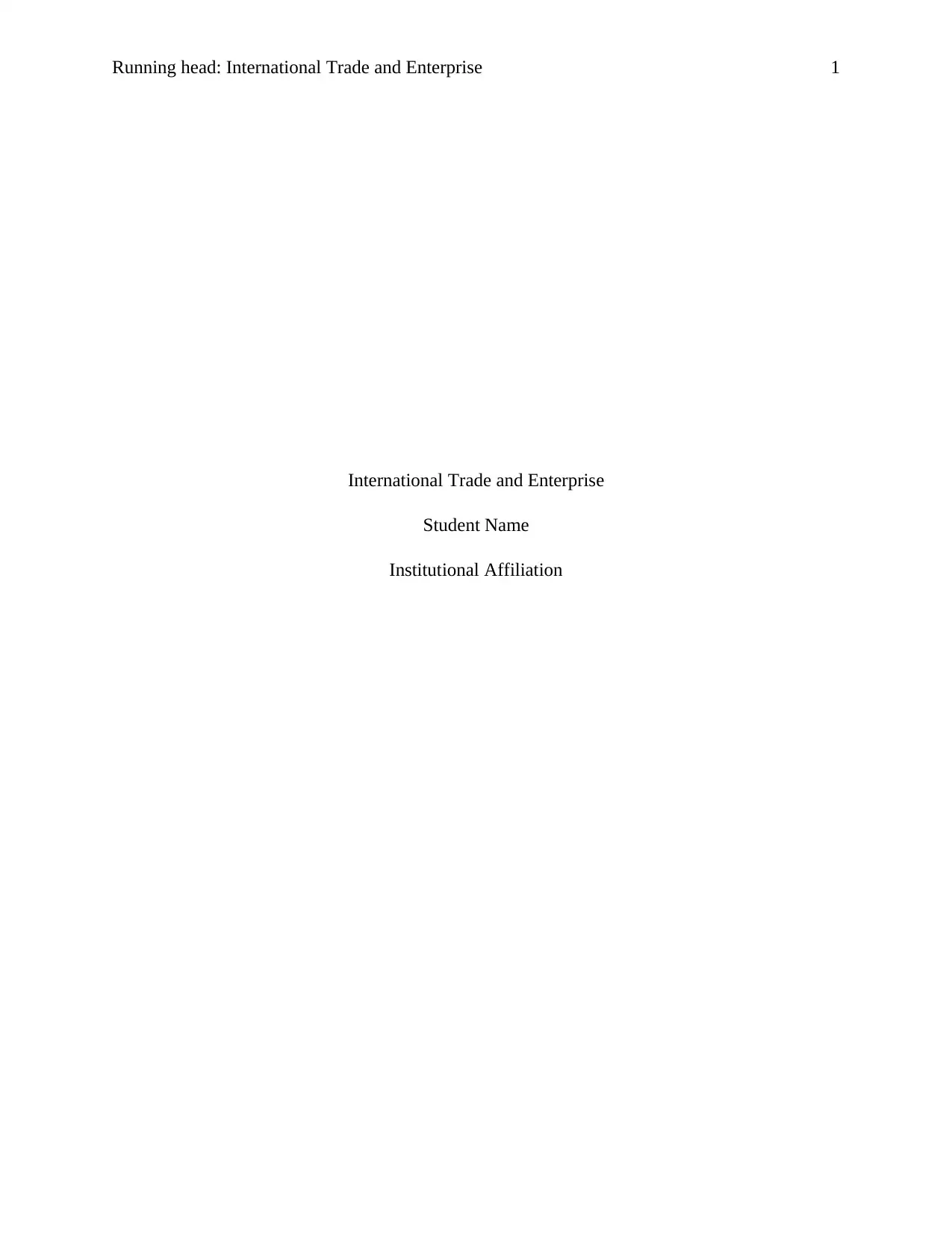
Running head: International Trade and Enterprise 1
International Trade and Enterprise
Student Name
Institutional Affiliation
International Trade and Enterprise
Student Name
Institutional Affiliation
Paraphrase This Document
Need a fresh take? Get an instant paraphrase of this document with our AI Paraphraser
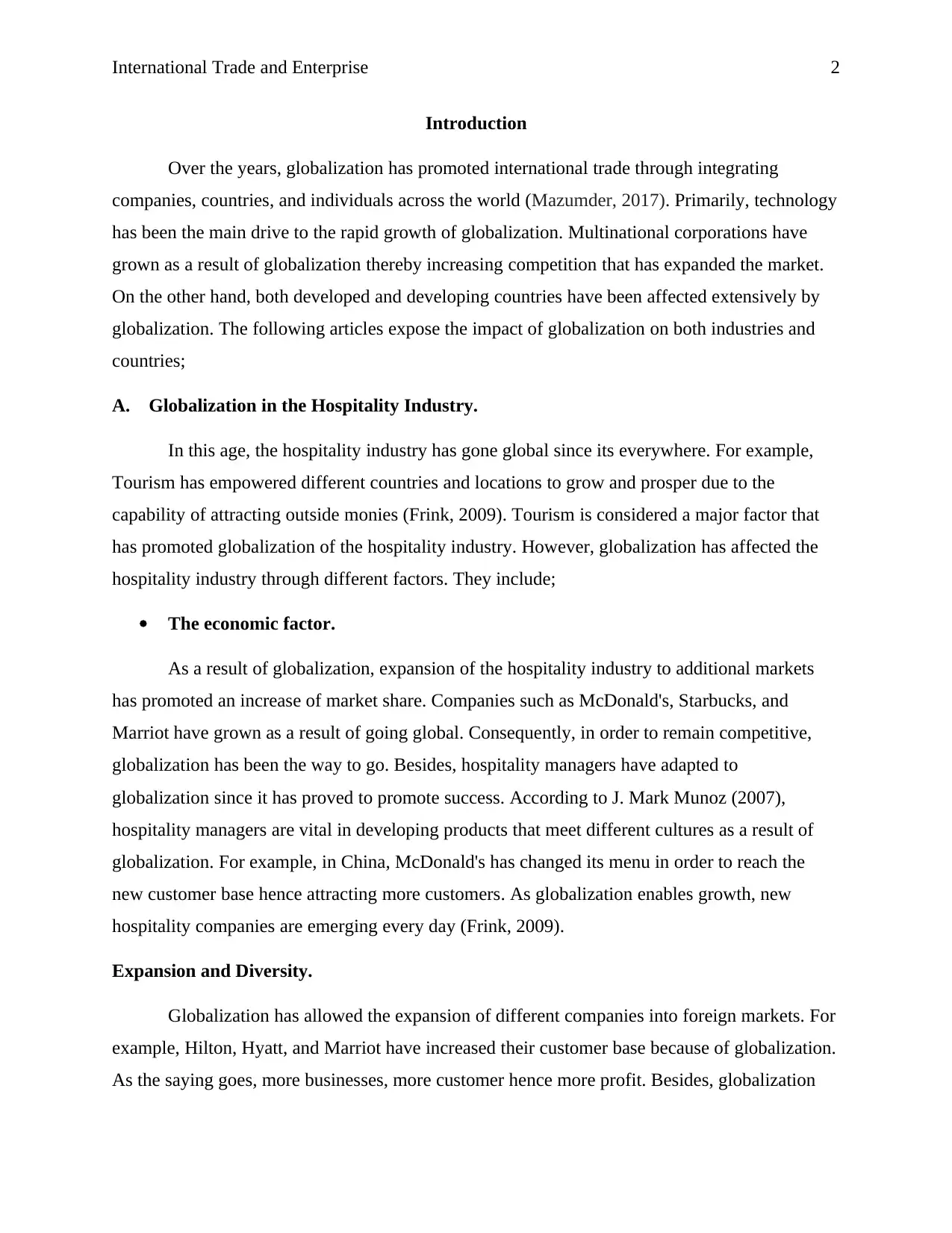
International Trade and Enterprise 2
Introduction
Over the years, globalization has promoted international trade through integrating
companies, countries, and individuals across the world (Mazumder, 2017). Primarily, technology
has been the main drive to the rapid growth of globalization. Multinational corporations have
grown as a result of globalization thereby increasing competition that has expanded the market.
On the other hand, both developed and developing countries have been affected extensively by
globalization. The following articles expose the impact of globalization on both industries and
countries;
A. Globalization in the Hospitality Industry.
In this age, the hospitality industry has gone global since its everywhere. For example,
Tourism has empowered different countries and locations to grow and prosper due to the
capability of attracting outside monies (Frink, 2009). Tourism is considered a major factor that
has promoted globalization of the hospitality industry. However, globalization has affected the
hospitality industry through different factors. They include;
The economic factor.
As a result of globalization, expansion of the hospitality industry to additional markets
has promoted an increase of market share. Companies such as McDonald's, Starbucks, and
Marriot have grown as a result of going global. Consequently, in order to remain competitive,
globalization has been the way to go. Besides, hospitality managers have adapted to
globalization since it has proved to promote success. According to J. Mark Munoz (2007),
hospitality managers are vital in developing products that meet different cultures as a result of
globalization. For example, in China, McDonald's has changed its menu in order to reach the
new customer base hence attracting more customers. As globalization enables growth, new
hospitality companies are emerging every day (Frink, 2009).
Expansion and Diversity.
Globalization has allowed the expansion of different companies into foreign markets. For
example, Hilton, Hyatt, and Marriot have increased their customer base because of globalization.
As the saying goes, more businesses, more customer hence more profit. Besides, globalization
Introduction
Over the years, globalization has promoted international trade through integrating
companies, countries, and individuals across the world (Mazumder, 2017). Primarily, technology
has been the main drive to the rapid growth of globalization. Multinational corporations have
grown as a result of globalization thereby increasing competition that has expanded the market.
On the other hand, both developed and developing countries have been affected extensively by
globalization. The following articles expose the impact of globalization on both industries and
countries;
A. Globalization in the Hospitality Industry.
In this age, the hospitality industry has gone global since its everywhere. For example,
Tourism has empowered different countries and locations to grow and prosper due to the
capability of attracting outside monies (Frink, 2009). Tourism is considered a major factor that
has promoted globalization of the hospitality industry. However, globalization has affected the
hospitality industry through different factors. They include;
The economic factor.
As a result of globalization, expansion of the hospitality industry to additional markets
has promoted an increase of market share. Companies such as McDonald's, Starbucks, and
Marriot have grown as a result of going global. Consequently, in order to remain competitive,
globalization has been the way to go. Besides, hospitality managers have adapted to
globalization since it has proved to promote success. According to J. Mark Munoz (2007),
hospitality managers are vital in developing products that meet different cultures as a result of
globalization. For example, in China, McDonald's has changed its menu in order to reach the
new customer base hence attracting more customers. As globalization enables growth, new
hospitality companies are emerging every day (Frink, 2009).
Expansion and Diversity.
Globalization has allowed the expansion of different companies into foreign markets. For
example, Hilton, Hyatt, and Marriot have increased their customer base because of globalization.
As the saying goes, more businesses, more customer hence more profit. Besides, globalization
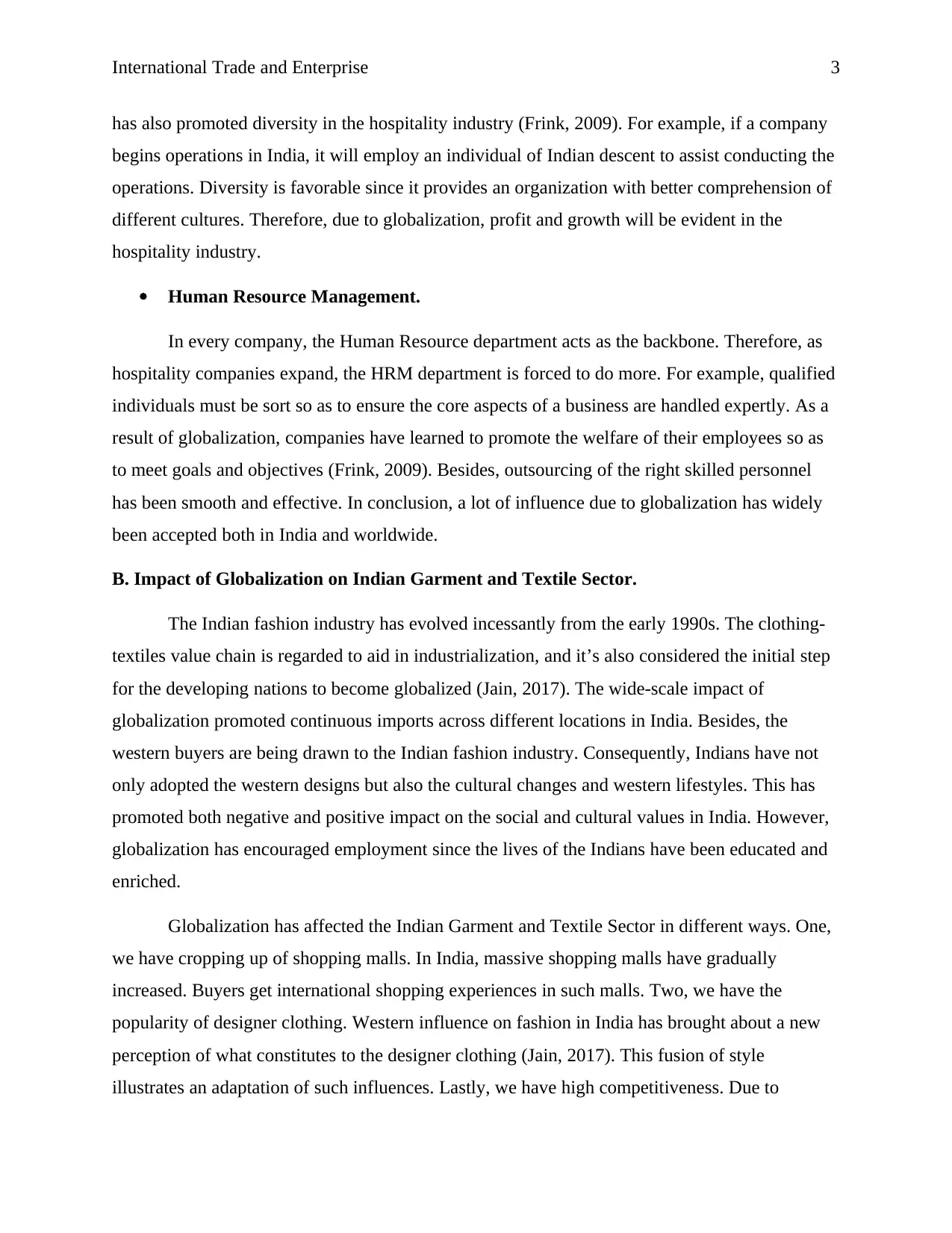
International Trade and Enterprise 3
has also promoted diversity in the hospitality industry (Frink, 2009). For example, if a company
begins operations in India, it will employ an individual of Indian descent to assist conducting the
operations. Diversity is favorable since it provides an organization with better comprehension of
different cultures. Therefore, due to globalization, profit and growth will be evident in the
hospitality industry.
Human Resource Management.
In every company, the Human Resource department acts as the backbone. Therefore, as
hospitality companies expand, the HRM department is forced to do more. For example, qualified
individuals must be sort so as to ensure the core aspects of a business are handled expertly. As a
result of globalization, companies have learned to promote the welfare of their employees so as
to meet goals and objectives (Frink, 2009). Besides, outsourcing of the right skilled personnel
has been smooth and effective. In conclusion, a lot of influence due to globalization has widely
been accepted both in India and worldwide.
B. Impact of Globalization on Indian Garment and Textile Sector.
The Indian fashion industry has evolved incessantly from the early 1990s. The clothing-
textiles value chain is regarded to aid in industrialization, and it’s also considered the initial step
for the developing nations to become globalized (Jain, 2017). The wide-scale impact of
globalization promoted continuous imports across different locations in India. Besides, the
western buyers are being drawn to the Indian fashion industry. Consequently, Indians have not
only adopted the western designs but also the cultural changes and western lifestyles. This has
promoted both negative and positive impact on the social and cultural values in India. However,
globalization has encouraged employment since the lives of the Indians have been educated and
enriched.
Globalization has affected the Indian Garment and Textile Sector in different ways. One,
we have cropping up of shopping malls. In India, massive shopping malls have gradually
increased. Buyers get international shopping experiences in such malls. Two, we have the
popularity of designer clothing. Western influence on fashion in India has brought about a new
perception of what constitutes to the designer clothing (Jain, 2017). This fusion of style
illustrates an adaptation of such influences. Lastly, we have high competitiveness. Due to
has also promoted diversity in the hospitality industry (Frink, 2009). For example, if a company
begins operations in India, it will employ an individual of Indian descent to assist conducting the
operations. Diversity is favorable since it provides an organization with better comprehension of
different cultures. Therefore, due to globalization, profit and growth will be evident in the
hospitality industry.
Human Resource Management.
In every company, the Human Resource department acts as the backbone. Therefore, as
hospitality companies expand, the HRM department is forced to do more. For example, qualified
individuals must be sort so as to ensure the core aspects of a business are handled expertly. As a
result of globalization, companies have learned to promote the welfare of their employees so as
to meet goals and objectives (Frink, 2009). Besides, outsourcing of the right skilled personnel
has been smooth and effective. In conclusion, a lot of influence due to globalization has widely
been accepted both in India and worldwide.
B. Impact of Globalization on Indian Garment and Textile Sector.
The Indian fashion industry has evolved incessantly from the early 1990s. The clothing-
textiles value chain is regarded to aid in industrialization, and it’s also considered the initial step
for the developing nations to become globalized (Jain, 2017). The wide-scale impact of
globalization promoted continuous imports across different locations in India. Besides, the
western buyers are being drawn to the Indian fashion industry. Consequently, Indians have not
only adopted the western designs but also the cultural changes and western lifestyles. This has
promoted both negative and positive impact on the social and cultural values in India. However,
globalization has encouraged employment since the lives of the Indians have been educated and
enriched.
Globalization has affected the Indian Garment and Textile Sector in different ways. One,
we have cropping up of shopping malls. In India, massive shopping malls have gradually
increased. Buyers get international shopping experiences in such malls. Two, we have the
popularity of designer clothing. Western influence on fashion in India has brought about a new
perception of what constitutes to the designer clothing (Jain, 2017). This fusion of style
illustrates an adaptation of such influences. Lastly, we have high competitiveness. Due to
⊘ This is a preview!⊘
Do you want full access?
Subscribe today to unlock all pages.

Trusted by 1+ million students worldwide
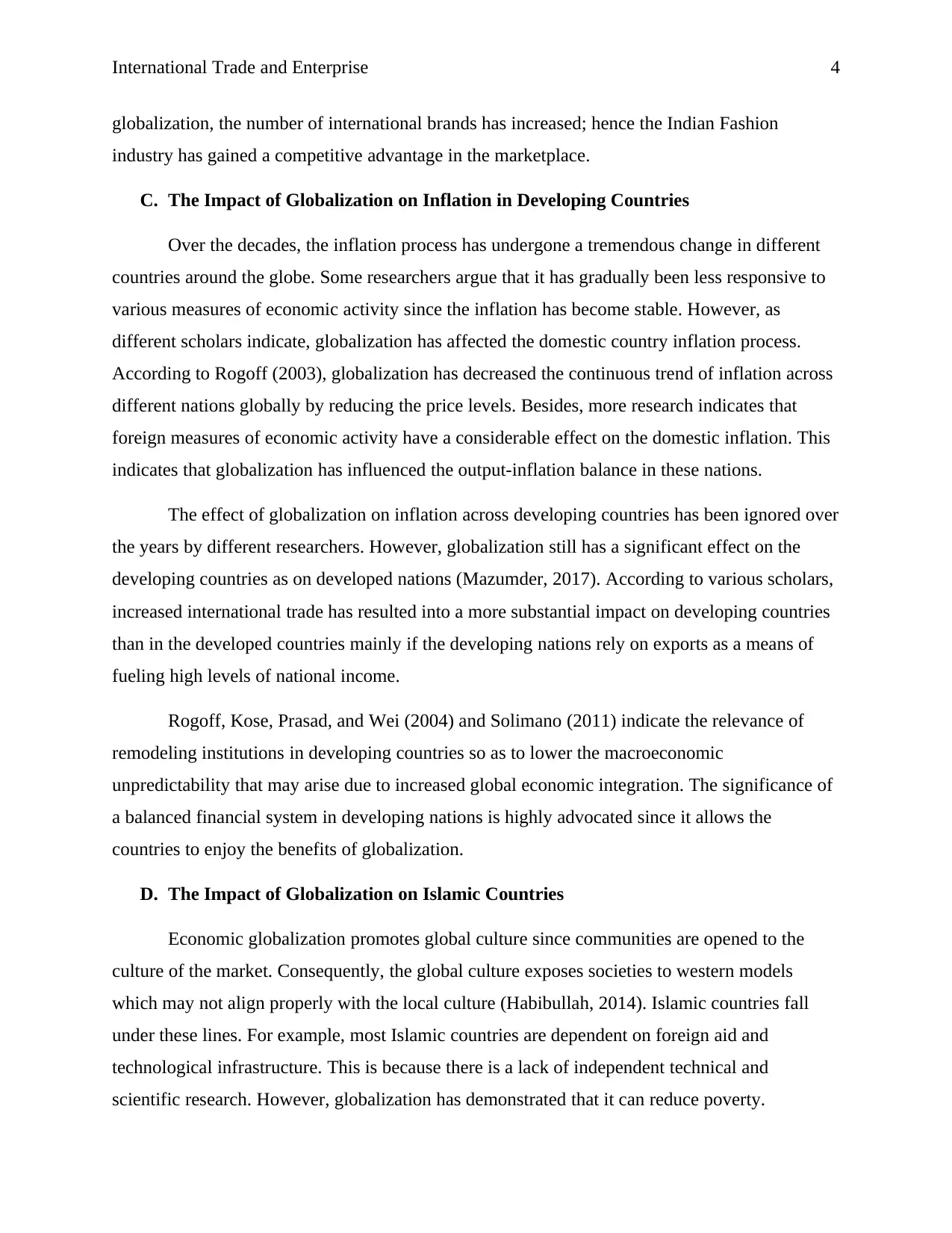
International Trade and Enterprise 4
globalization, the number of international brands has increased; hence the Indian Fashion
industry has gained a competitive advantage in the marketplace.
C. The Impact of Globalization on Inflation in Developing Countries
Over the decades, the inflation process has undergone a tremendous change in different
countries around the globe. Some researchers argue that it has gradually been less responsive to
various measures of economic activity since the inflation has become stable. However, as
different scholars indicate, globalization has affected the domestic country inflation process.
According to Rogoff (2003), globalization has decreased the continuous trend of inflation across
different nations globally by reducing the price levels. Besides, more research indicates that
foreign measures of economic activity have a considerable effect on the domestic inflation. This
indicates that globalization has influenced the output-inflation balance in these nations.
The effect of globalization on inflation across developing countries has been ignored over
the years by different researchers. However, globalization still has a significant effect on the
developing countries as on developed nations (Mazumder, 2017). According to various scholars,
increased international trade has resulted into a more substantial impact on developing countries
than in the developed countries mainly if the developing nations rely on exports as a means of
fueling high levels of national income.
Rogoff, Kose, Prasad, and Wei (2004) and Solimano (2011) indicate the relevance of
remodeling institutions in developing countries so as to lower the macroeconomic
unpredictability that may arise due to increased global economic integration. The significance of
a balanced financial system in developing nations is highly advocated since it allows the
countries to enjoy the benefits of globalization.
D. The Impact of Globalization on Islamic Countries
Economic globalization promotes global culture since communities are opened to the
culture of the market. Consequently, the global culture exposes societies to western models
which may not align properly with the local culture (Habibullah, 2014). Islamic countries fall
under these lines. For example, most Islamic countries are dependent on foreign aid and
technological infrastructure. This is because there is a lack of independent technical and
scientific research. However, globalization has demonstrated that it can reduce poverty.
globalization, the number of international brands has increased; hence the Indian Fashion
industry has gained a competitive advantage in the marketplace.
C. The Impact of Globalization on Inflation in Developing Countries
Over the decades, the inflation process has undergone a tremendous change in different
countries around the globe. Some researchers argue that it has gradually been less responsive to
various measures of economic activity since the inflation has become stable. However, as
different scholars indicate, globalization has affected the domestic country inflation process.
According to Rogoff (2003), globalization has decreased the continuous trend of inflation across
different nations globally by reducing the price levels. Besides, more research indicates that
foreign measures of economic activity have a considerable effect on the domestic inflation. This
indicates that globalization has influenced the output-inflation balance in these nations.
The effect of globalization on inflation across developing countries has been ignored over
the years by different researchers. However, globalization still has a significant effect on the
developing countries as on developed nations (Mazumder, 2017). According to various scholars,
increased international trade has resulted into a more substantial impact on developing countries
than in the developed countries mainly if the developing nations rely on exports as a means of
fueling high levels of national income.
Rogoff, Kose, Prasad, and Wei (2004) and Solimano (2011) indicate the relevance of
remodeling institutions in developing countries so as to lower the macroeconomic
unpredictability that may arise due to increased global economic integration. The significance of
a balanced financial system in developing nations is highly advocated since it allows the
countries to enjoy the benefits of globalization.
D. The Impact of Globalization on Islamic Countries
Economic globalization promotes global culture since communities are opened to the
culture of the market. Consequently, the global culture exposes societies to western models
which may not align properly with the local culture (Habibullah, 2014). Islamic countries fall
under these lines. For example, most Islamic countries are dependent on foreign aid and
technological infrastructure. This is because there is a lack of independent technical and
scientific research. However, globalization has demonstrated that it can reduce poverty.
Paraphrase This Document
Need a fresh take? Get an instant paraphrase of this document with our AI Paraphraser
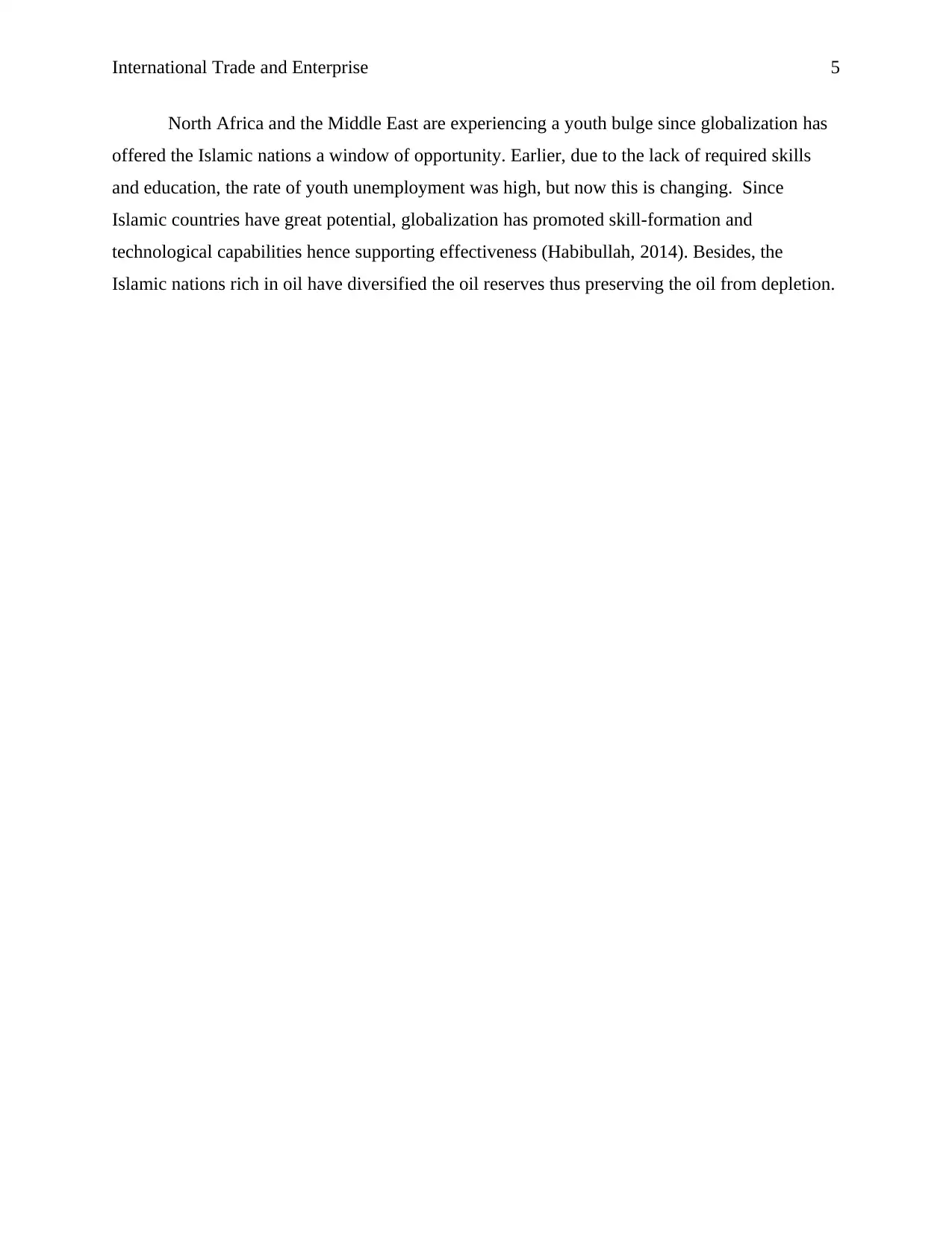
International Trade and Enterprise 5
North Africa and the Middle East are experiencing a youth bulge since globalization has
offered the Islamic nations a window of opportunity. Earlier, due to the lack of required skills
and education, the rate of youth unemployment was high, but now this is changing. Since
Islamic countries have great potential, globalization has promoted skill-formation and
technological capabilities hence supporting effectiveness (Habibullah, 2014). Besides, the
Islamic nations rich in oil have diversified the oil reserves thus preserving the oil from depletion.
North Africa and the Middle East are experiencing a youth bulge since globalization has
offered the Islamic nations a window of opportunity. Earlier, due to the lack of required skills
and education, the rate of youth unemployment was high, but now this is changing. Since
Islamic countries have great potential, globalization has promoted skill-formation and
technological capabilities hence supporting effectiveness (Habibullah, 2014). Besides, the
Islamic nations rich in oil have diversified the oil reserves thus preserving the oil from depletion.
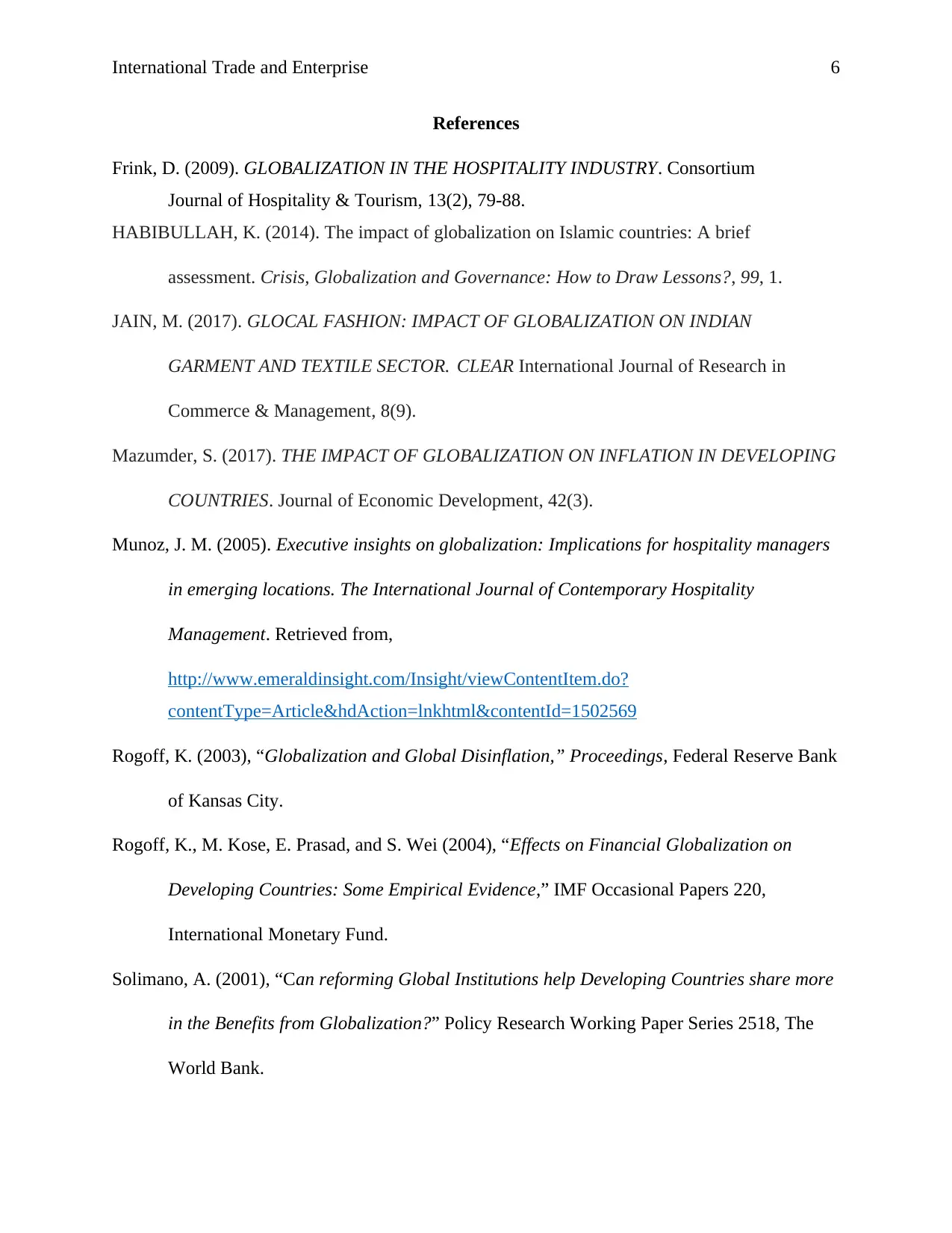
International Trade and Enterprise 6
References
Frink, D. (2009). GLOBALIZATION IN THE HOSPITALITY INDUSTRY. Consortium
Journal of Hospitality & Tourism, 13(2), 79-88.
HABIBULLAH, K. (2014). The impact of globalization on Islamic countries: A brief
assessment. Crisis, Globalization and Governance: How to Draw Lessons?, 99, 1.
JAIN, M. (2017). GLOCAL FASHION: IMPACT OF GLOBALIZATION ON INDIAN
GARMENT AND TEXTILE SECTOR. CLEAR International Journal of Research in
Commerce & Management, 8(9).
Mazumder, S. (2017). THE IMPACT OF GLOBALIZATION ON INFLATION IN DEVELOPING
COUNTRIES. Journal of Economic Development, 42(3).
Munoz, J. M. (2005). Executive insights on globalization: Implications for hospitality managers
in emerging locations. The International Journal of Contemporary Hospitality
Management. Retrieved from,
http://www.emeraldinsight.com/Insight/viewContentItem.do?
contentType=Article&hdAction=lnkhtml&contentId=1502569
Rogoff, K. (2003), “Globalization and Global Disinflation,” Proceedings, Federal Reserve Bank
of Kansas City.
Rogoff, K., M. Kose, E. Prasad, and S. Wei (2004), “Effects on Financial Globalization on
Developing Countries: Some Empirical Evidence,” IMF Occasional Papers 220,
International Monetary Fund.
Solimano, A. (2001), “Can reforming Global Institutions help Developing Countries share more
in the Benefits from Globalization?” Policy Research Working Paper Series 2518, The
World Bank.
References
Frink, D. (2009). GLOBALIZATION IN THE HOSPITALITY INDUSTRY. Consortium
Journal of Hospitality & Tourism, 13(2), 79-88.
HABIBULLAH, K. (2014). The impact of globalization on Islamic countries: A brief
assessment. Crisis, Globalization and Governance: How to Draw Lessons?, 99, 1.
JAIN, M. (2017). GLOCAL FASHION: IMPACT OF GLOBALIZATION ON INDIAN
GARMENT AND TEXTILE SECTOR. CLEAR International Journal of Research in
Commerce & Management, 8(9).
Mazumder, S. (2017). THE IMPACT OF GLOBALIZATION ON INFLATION IN DEVELOPING
COUNTRIES. Journal of Economic Development, 42(3).
Munoz, J. M. (2005). Executive insights on globalization: Implications for hospitality managers
in emerging locations. The International Journal of Contemporary Hospitality
Management. Retrieved from,
http://www.emeraldinsight.com/Insight/viewContentItem.do?
contentType=Article&hdAction=lnkhtml&contentId=1502569
Rogoff, K. (2003), “Globalization and Global Disinflation,” Proceedings, Federal Reserve Bank
of Kansas City.
Rogoff, K., M. Kose, E. Prasad, and S. Wei (2004), “Effects on Financial Globalization on
Developing Countries: Some Empirical Evidence,” IMF Occasional Papers 220,
International Monetary Fund.
Solimano, A. (2001), “Can reforming Global Institutions help Developing Countries share more
in the Benefits from Globalization?” Policy Research Working Paper Series 2518, The
World Bank.
⊘ This is a preview!⊘
Do you want full access?
Subscribe today to unlock all pages.

Trusted by 1+ million students worldwide
1 out of 6
Related Documents
Your All-in-One AI-Powered Toolkit for Academic Success.
+13062052269
info@desklib.com
Available 24*7 on WhatsApp / Email
![[object Object]](/_next/static/media/star-bottom.7253800d.svg)
Unlock your academic potential
Copyright © 2020–2025 A2Z Services. All Rights Reserved. Developed and managed by ZUCOL.





